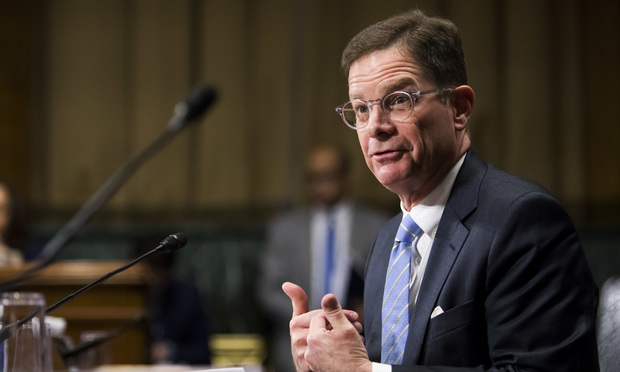Democrats Press Fifth Circuit Nominee on Sexual Harassment Decisions
Senators repeatedly asked U.S. District Judge Kurt Engelhardt about his decisions tossing several sexual harassment cases.
January 10, 2018 at 02:27 PM
6 minute read
 Kurt Engelhardt testifies before the Senate Judiciary Committee during his confirmation hearing to be U.S. Circuit Judge for the Fifth Circuit Wednesday. (Photo: Diego M. Radzinschi/ALM)
Kurt Engelhardt testifies before the Senate Judiciary Committee during his confirmation hearing to be U.S. Circuit Judge for the Fifth Circuit Wednesday. (Photo: Diego M. Radzinschi/ALM)
As the legal community continues to grapple with sexual harassment allegations against judges, Democratic senators are intensifying their focus on how judges approach sexual harassment lawsuits.
In a hearing Wednesday, Democratic senators pushed U.S. District Judge Kurt Engelhardt, nominated by President Donald Trump for a spot on the U.S. Court of Appeals for the Fifth Circuit, on his decisions in several sexual harassment and discrimination lawsuits in the Eastern District of Louisiana. Senators wanted to know how and why Engelhardt decided to dismiss several cases.
The district judge said that, while the facts alleged were disturbing, he is required to perform a specific legal analysis that follows case law and precedent, and that does not always yield a certain outcome.
“The problem with the sexual harassment cases is that the facts … are so egregious, and so offensive and shocking, and so unacceptable, that you read the brief and, there must be some sort of recovery for the plaintiff,” Englehardt said in response to a question from Sen. Christopher Coons, D-Delaware. “And yet, we then get to the law and the provisions of Title VII. And we have several tests that we apply in these cases and several prongs that must be met in order for the plaintiff to overcome a summary judgment hurdle, any one of which, the plaintiff fails, and the case is subject to dismissal on summary judgment.”
As with the rest of the country, sexual harassment has taken center stage as a major issue in the judiciary in recent weeks. Late last year, Ninth Circuit Judge Alex Kozinski stepped down amid allegations of harassment from several of his former law clerks. Chief Justice John Roberts said sexual harassment requires serious attention from the federal judiciary in his year-end report.
In the hearing Wednesday, Sen. Mazie Hirono, D-Hawaii, directly asked Englehardt if he had ever made unwanted requests for sexual favors or settled any sexual harassment claims against him. He answered no to both questions.
Coons and several other senators asked Engelhardt about his 2004 opinion in a case in which the EEOC sued a Rite Aid franchisee on behalf of a female security guard who claimed she was verbally and physically harassed by her male co-workers.
In the opinion, Engelhardt wrote that, to prevail, the plaintiff had to show the harassment “altered the terms and conditions of her employment.”
Engelhardt found that the male co-workers' actions, which included remarking on the plaintiffs' physical appearance and brushing up against her in store aisles, were not “sufficiently severe or pervasive so as to alter a 'term, condition, or privilege' of employment.”
Hirono and Sen. Kamala Harris, D-California, who was just appointed to the committee yesterday, both asked about Engelhardt's 2011 opinion in a case where the plaintiff alleged she was the victim of sexual harassment by a female supervisor. Engelhardt dismissed the case for a procedural reason but went on to address the merits in his opinion anyway.
He wrote that the alleged harassment, which included “sensual back rubs” and verbal comments, did “not rise to the level of actionable harassment.” Asked if Englehardt found it a “close case,” Engelhardt said most sexual harassment cases are “close cases” but that, in the end, legal analysis must dictate the outcome.
“Things that are not acceptable in the workplace don't always survive the test that is set forth in Title VII,” Englehardt said.
The other case raised by several senators was one in which Engelhardt ruled against a woman who claimed she faced pregnancy discrimination. In the case, the plaintiff was on medical leave for several weeks due to pregnancy complications and was fired after having an emergency C-section.
In the 2010 opinion, Englehardt wrote that the plaintiff failed to show she was qualified for the position because she could not go to work, which was a requirement of the job.
“The fact that the Plaintiff's absences were caused by pregnancy does not dispense with the general requirement that employees must show up for work. Indeed, it is well-established that a pregnant employee is only entitled to be treated as well as other non-pregnant employees, not better,” Engelhardt wrote.
Questioned about the ruling by Harris, Englehardt said he couldn't recall the specifics of the case but that he was sure he applied the appropriate law.
“Again, as part of the prongs of the analysis that I'm legally required to apply, there are other employees, there are comparisons, and to show that there is some special effort made to punish or deprive a person of their position. And I know that I employed that analysis in that case because I do it in every case,” he said.
The Rite Aid case was not appealed. The other two were, but they were dismissed before the merits of the appeal were addressed.
Read more:
New Additions to Senate Committee Fuel Hope for Greater Focus on Diversity in Judicial Nominees
Next Steps in the Federal Judiciary's #MeToo Moment
Microsoft, Fighting Class Action, Acknowledges Gender Imbalances in Tech Industry
This content has been archived. It is available through our partners, LexisNexis® and Bloomberg Law.
To view this content, please continue to their sites.
Not a Lexis Subscriber?
Subscribe Now
Not a Bloomberg Law Subscriber?
Subscribe Now
NOT FOR REPRINT
© 2025 ALM Global, LLC, All Rights Reserved. Request academic re-use from www.copyright.com. All other uses, submit a request to [email protected]. For more information visit Asset & Logo Licensing.
You Might Like
View All

Eversheds Sutherland Adds Hunton Andrews Energy Lawyer With Cross-Border Experience
3 minute read
Ex-Marathon General Counsel Takes Legal Reins of Another Energy Company

After Nearly 2 Decades in the Role, Longtime Haynes and Boone General Counsel Passes the Baton
3 minute readTrending Stories
- 16-48. It’s Comp Time Again: How To Crush Your Comp Memo
- 2'Religious Discrimination'?: 4th Circuit Revives Challenge to Employer Vaccine Mandate
- 3Fight Over Amicus-Funding Disclosure Surfaces in Google Play Appeal
- 4The Power of Student Prior Knowledge in Legal Education
- 5Chicago Cubs' IP Claim to Continue Against Wrigley View Rooftop, Judge Rules
Who Got The Work
Michael G. Bongiorno, Andrew Scott Dulberg and Elizabeth E. Driscoll from Wilmer Cutler Pickering Hale and Dorr have stepped in to represent Symbotic Inc., an A.I.-enabled technology platform that focuses on increasing supply chain efficiency, and other defendants in a pending shareholder derivative lawsuit. The case, filed Oct. 2 in Massachusetts District Court by the Brown Law Firm on behalf of Stephen Austen, accuses certain officers and directors of misleading investors in regard to Symbotic's potential for margin growth by failing to disclose that the company was not equipped to timely deploy its systems or manage expenses through project delays. The case, assigned to U.S. District Judge Nathaniel M. Gorton, is 1:24-cv-12522, Austen v. Cohen et al.
Who Got The Work
Edmund Polubinski and Marie Killmond of Davis Polk & Wardwell have entered appearances for data platform software development company MongoDB and other defendants in a pending shareholder derivative lawsuit. The action, filed Oct. 7 in New York Southern District Court by the Brown Law Firm, accuses the company's directors and/or officers of falsely expressing confidence in the company’s restructuring of its sales incentive plan and downplaying the severity of decreases in its upfront commitments. The case is 1:24-cv-07594, Roy v. Ittycheria et al.
Who Got The Work
Amy O. Bruchs and Kurt F. Ellison of Michael Best & Friedrich have entered appearances for Epic Systems Corp. in a pending employment discrimination lawsuit. The suit was filed Sept. 7 in Wisconsin Western District Court by Levine Eisberner LLC and Siri & Glimstad on behalf of a project manager who claims that he was wrongfully terminated after applying for a religious exemption to the defendant's COVID-19 vaccine mandate. The case, assigned to U.S. Magistrate Judge Anita Marie Boor, is 3:24-cv-00630, Secker, Nathan v. Epic Systems Corporation.
Who Got The Work
David X. Sullivan, Thomas J. Finn and Gregory A. Hall from McCarter & English have entered appearances for Sunrun Installation Services in a pending civil rights lawsuit. The complaint was filed Sept. 4 in Connecticut District Court by attorney Robert M. Berke on behalf of former employee George Edward Steins, who was arrested and charged with employing an unregistered home improvement salesperson. The complaint alleges that had Sunrun informed the Connecticut Department of Consumer Protection that the plaintiff's employment had ended in 2017 and that he no longer held Sunrun's home improvement contractor license, he would not have been hit with charges, which were dismissed in May 2024. The case, assigned to U.S. District Judge Jeffrey A. Meyer, is 3:24-cv-01423, Steins v. Sunrun, Inc. et al.
Who Got The Work
Greenberg Traurig shareholder Joshua L. Raskin has entered an appearance for boohoo.com UK Ltd. in a pending patent infringement lawsuit. The suit, filed Sept. 3 in Texas Eastern District Court by Rozier Hardt McDonough on behalf of Alto Dynamics, asserts five patents related to an online shopping platform. The case, assigned to U.S. District Judge Rodney Gilstrap, is 2:24-cv-00719, Alto Dynamics, LLC v. boohoo.com UK Limited.
Featured Firms
Law Offices of Gary Martin Hays & Associates, P.C.
(470) 294-1674
Law Offices of Mark E. Salomone
(857) 444-6468
Smith & Hassler
(713) 739-1250






